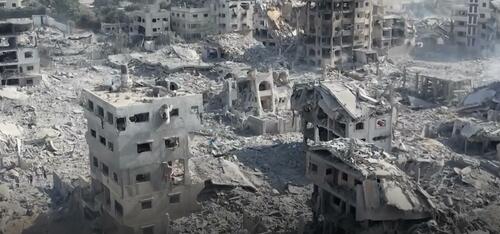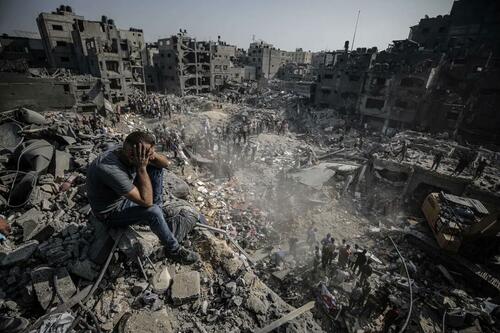
As civilian casualties in the Israel-Hamas war continue to mount -- surpassing 20,000 from a population of just 2 million -- alarm is growing over Israel's all-too-eager use of a particularly devastating weapon: the 2,000-pound MK-84 bomb.
Gaza is one of the most densely populated areas on Earth. For most other militaries, that would be cause for restraint, particularly where the MK-84 is concerned, given its 3,280-foot hazardous blast radius. However, as the IDF presses its campaign against the militant group Hamas and its elaborate tunnel system, it's exhibiting an unusually high tolerance for civilian harm.

Proportionally, the rate of damage to civilian buildings in Gaza is already triple what Nazi Germany suffered from Allied bombs in World War II. On Friday alone, Israel reportedly killed more than 90 Palestinians, including women in children, when it leveled two houses in two different areas of Gaza.
One particularly vivid display of the MK-84's sheer power -- and Israel's lack of restraint -- came with the IDF's Oct. 31 strike on Jabalya, in northern Gaza, which obliterated a large residential area. “[That strike is] something we would never see the US doing," Larry Lewis, research director at the Center for Naval Analyses, tells CNN. “It certainly appears that (Israel’s) tolerance for civilian harm compared to expected operational benefits is significantly different than what we would accept."

For perspective, consider that the US military used only one MK-84 bomb during its entire fight with ISIS. However, it's poured an astounding 5,400 of them into Israel's arsenal since the Oct. 7 Hamas invasion of southern Israel.
Defying IDF assurances that it seeks to minimize civilian casualties, a New York Times analysis of satellite imagery suggests that Israel has even dropped more than 200 MK-84 bombs in the area of South Gaza where it told Palestinians to flee for safety.
The IDF has brushed aside inquiries about its use of the extraordinarily destructive bombs. "Questions of this kind will be looked into at a later stage," a spokesman told the Times, adding that the IDF “takes feasible precautions to mitigate civilian harm.”
Israel routinely used one of its biggest and most destructive bombs in areas it designated as safe for civilians in Gaza during the first six weeks of the war, a visual analysis by The New York Times found. See the full visual investigation here. https://t.co/0qPLwaT7td pic.twitter.com/Vm24DnViGn
— The New York Times (@nytimes) December 22, 2023
“The devastation that we’ve seen for communities in Gaza is unfortunately co-signed by the United States,” John Chappell of the DC-based Center for Civilians in Conflict tells CNN. “Too much of it is carried out by bombs that were made in the United States.”
Expect that damning fact to be long-remembered by the survivors of Israel's Gaza campaign -- and millions of others who sympathize with them. Whether one supports the US government's arming of Israel or not, nobody should be so naive as to think it doesn't endanger American lives -- particularly when you consider the type of people who now control Israel's arsenal.
As civilian casualties in the Israel-Hamas war continue to mount — surpassing 20,000 from a population of just 2 million — alarm is growing over Israel’s all-too-eager use of a particularly devastating weapon: the 2,000-pound MK-84 bomb.
Gaza is one of the most densely populated areas on Earth. For most other militaries, that would be cause for restraint, particularly where the MK-84 is concerned, given its 3,280-foot hazardous blast radius. However, as the IDF presses its campaign against the militant group Hamas and its elaborate tunnel system, it’s exhibiting an unusually high tolerance for civilian harm.

Proportionally, the rate of damage to civilian buildings in Gaza is already triple what Nazi Germany suffered from Allied bombs in World War II. On Friday alone, Israel reportedly killed more than 90 Palestinians, including women in children, when it leveled two houses in two different areas of Gaza.
One particularly vivid display of the MK-84’s sheer power — and Israel’s lack of restraint — came with the IDF’s Oct. 31 strike on Jabalya, in northern Gaza, which obliterated a large residential area. “[That strike is] something we would never see the US doing,” Larry Lewis, research director at the Center for Naval Analyses, tells CNN. “It certainly appears that (Israel’s) tolerance for civilian harm compared to expected operational benefits is significantly different than what we would accept.”

For perspective, consider that the US military used only one MK-84 bomb during its entire fight with ISIS. However, it’s poured an astounding 5,400 of them into Israel’s arsenal since the Oct. 7 Hamas invasion of southern Israel.
Defying IDF assurances that it seeks to minimize civilian casualties, a New York Times analysis of satellite imagery suggests that Israel has even dropped more than 200 MK-84 bombs in the area of South Gaza where it told Palestinians to flee for safety.
The IDF has brushed aside inquiries about its use of the extraordinarily destructive bombs. “Questions of this kind will be looked into at a later stage,” a spokesman told the Times, adding that the IDF “takes feasible precautions to mitigate civilian harm.”
Israel routinely used one of its biggest and most destructive bombs in areas it designated as safe for civilians in Gaza during the first six weeks of the war, a visual analysis by The New York Times found. See the full visual investigation here. https://t.co/0qPLwaT7td pic.twitter.com/Vm24DnViGn
— The New York Times (@nytimes) December 22, 2023
“The devastation that we’ve seen for communities in Gaza is unfortunately co-signed by the United States,” John Chappell of the DC-based Center for Civilians in Conflict tells CNN. “Too much of it is carried out by bombs that were made in the United States.”
Expect that damning fact to be long-remembered by the survivors of Israel’s Gaza campaign — and millions of others who sympathize with them. Whether one supports the US government’s arming of Israel or not, nobody should be so naive as to think it doesn’t endanger American lives — particularly when you consider the type of people who now control Israel’s arsenal.
Loading…






